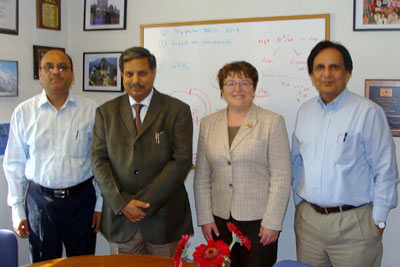Former Borlaug fellow establishes new food science program in India
By John Bakum

How do you start a food science and technology (FST) center where no land, buildings, laboratories, research facilities, students or faculty exist? Alok Jha, a 2006 Borlaug fellow at Cornell, faced this challenge as a faculty member at Banaras Hindu University (BHU) in his native India in 2007. Since then, he has established such a program at BHU that is awarding Ph.D. and master's degrees in food science and will begin accepting undergraduates in 2013.
"The program is a valuable resource for farmers in Uttar Pradesh and an important addition to BHU's agricultural curriculum," said Jha, who coordinates the BHU Centre of Food Science and Technology. "My experience as a Borlaug fellow helped me win the original award. I was able to apply so many things I learned at Cornell, from curriculum building to extension work to efficient ways to keep food laboratories clean and safe."
Cornell's Borlaug Fellows Program, directed by Francine Jasper in International Programs in the College of Agriculture and Life Sciences and funded by the U.S. Department of Agriculture, provides short-term scientific training and research opportunities to visiting researchers, policymakers and university faculty from developing countries. Jha was a Borlaug fellow in the laboratory of Syed Rizvi, Cornell professor of food process engineering and international professor of food science.
"Professor Alok Jha used his exposure to our program to establish a state-of-the-art food science and technology program where none existed before," said Rizvi. "This is a great testament to the vision of the fellowship."
Food technology is an emerging and critical science in India, which produces vast quantities of fruit, vegetables, milk and grain that are often wasted -- or unsafe to eat -- because only 2 to 5 percent of the fruits and vegetables are subjected to food processing practices, according to Rizvi.
When the Indian Department of Biotechnology issued a letter of intent to fund a FST program at an Indian university, Jha's proposal was one of four out of 50 that were funded. It was the only proposal from a university that did not already have a FST program.
Land was set aside, a state-of-the-art building with smart classrooms and laboratory/research space was constructed, and a faculty search initiated. Based on the food science faculty he had met at Cornell, Jha knew he was looking for knowledgeable people who could reach out and do extension work. Jha also worked to develop international linkages, forging faculty exchanges between BHU and European institutions, and spearheading a MOU between BHU and the National Dairy Research Institute in Karnal, India -- the institute that sponsored him as a Borlaug fellow at Cornell.
Another challenge was to inform people in communities around BHU about the new program and the value-added food processing expertise available. Again, Jha drew on his Cornell experience.
"As a Borlaug fellow, I saw firsthand many examples of useful extension work. With those contacts I was able to invite Cornell faculty like Syed Rizvi and K.V. Raman, professor of plant breeding, to help train BHU faculty and staff," he said.
The initiative to institute and/or revise agricultural curricula like the food science program at BHU -- and others like it in the fields of biotechnology, agriculture and animal and dairy science at state agricultural universities in India -- is now being funded through the Agricultural Innovation Partnership (AIP), under the U.S. Agency for International Development's "Feed the Future" initiative. Cornell was named the lead institute of the initiative when AIP was launched in February 2011.
John Bakum is a communications specialist with International Programs in CALS.
Media Contact
Get Cornell news delivered right to your inbox.
Subscribe